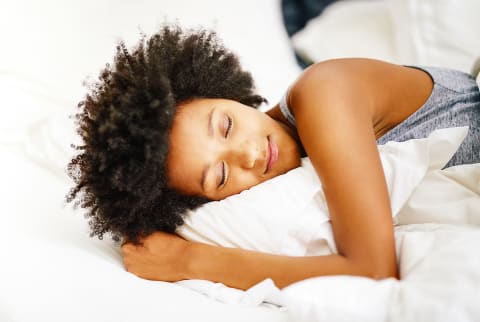Advertisement
Sleep Disorders Show Up Differently In Women: Here's When To See A Specialist


General sleep advice is great and all, but there's a level of nuance that's been lacking in sleep conversations—particularly around sleep struggles that are unique to women.
"We've generalized this information for the longest time," board-certified sleep medicine doctor Funke Afolabi-Brown, M.D., tells mindbodygreen. But considering that women are up to 30 to 40% more likely1 to report sleep difficulties than men, Afolabi-Brown and a growing network of physicians are now calling for us to get more specific about how sleep varies by the sexes.
Why women are more likely to struggle with sleep
At least some of the sleep differences between men and women are thought to be a matter of biology. The hormonal shifts2 that women experience through puberty, menstruation, pregnancy, and perimenopause are all known to impact sleep quality.
There's also a social element at play. Generally speaking, there's an expectation put on women to care for others—which can leave them with less time to care for themselves. Jam-packed schedules leave us stressed, anxious, and overwhelmed come bedtime.
Afolabi-Brown notes that some medical sleep disorders are also more prevalent in women than men. Restless leg syndrome is one of them, which can be related to iron deficiencies3 that are much more common among people who menstruate. Women are also as much as twice as likely to have insomnia, fueled by anxiety and neurodevelopmental differences like ADHD and autism spectrum disorder (also common and underdiagnosed in women).
Years of male-dominant diagnostic criteria also mean that many women with sleep disorders are slipping through the cracks. "Obstructive sleep apnea is often missed in women," Afolabi-Brown gives as an example, since so many people's idea of a sleep apnea patient is a middle-aged man who snores loudly and is likely overweight. In reality, she says, women can be just as likely to develop it (especially during pregnancy4), but it might manifest as disrupted sleep, headaches, and insomnia instead of the hallmark snoring.
Considering these societal pressures, physiological differences, and diagnostic gender biases, Afolabi-Brown says that "it's almost as if the cards are stacked against us a little—a lot, actually." After years of grinning and bearing sleep deprivation herself, she committed to helping women prioritize their sleep and get the treatment they need. (Psst...she's teaming up with seven other sleep specialists this weekend for a Women's Sleep Summit; head here to learn more details and register to attend live or watch the recording.)
What to do
Since women are at a slight disadvantage in the sleep department, it's even more important for us to prioritize our sleep all day long.
One way to do so, Afolabi-Brown says, is to build breaks into your schedule (like, actual breaks). "We have to create pauses in the day—and we have to do so intentionally," she says. "The day is not going to give that to us." In addition to taking breathers throughout the day, carving out time for a consistent wind-down routine, or "buffer zone," before bed is key.
It doesn't have to take all night: Meditating, journaling, and taking a hot bath or shower are all nightly rituals that pack a lot of relaxation into a short amount of time, Afolabi-Brown notes.
Intentionally building your "sleep drive," or sleep pressure5, throughout the day is also essential. Just like the pressure cooker in your kitchen fills with steam, your body's desire to sleep builds throughout the day. Ideally, it reaches its peak around your bedtime, when you can "release the valve" and get some rest before starting the building process over again the next day.
Taking long naps (over 20 to 30 minutes) throughout the day, staying stagnant and not exercising, sleeping in, and drinking a lot of caffeine are all examples of habits that will reduce your sleep pressure and make it more difficult to fall asleep at night.
When to see a specialist
Structuring your day with breaks and sleep pressure-building activities can go a long way in enhancing your sleep at night. Maintaining a consistent sleep schedule, avoiding certain foods and alcohol before bed, and taking a well-formulated sleep supplement (ideally one that's hormone-free, so not melatonin) are all ways for women to support their sleep health.
If you've cleaned up your sleep habits and are still noticing any of the following symptoms, Afolabi-Brown says it could be time to see a sleep specialist for an evaluation to rule out an underlying disorder:
- Snoring or dry mouth upon waking
- Frequent nighttime awakenings
- Night sweats
- Excessive daytime fatigue even after getting enough sleep
- Leg or arm discomfort
The takeaway
As women, the odds are not in our favor in the sleep department. As such, we need to pay sleep our full attention—and speak up when it's off. As Afolabi-Brown says, "Sleep is not just something we do at the end of our day. It's actually a fundamental necessity to life."